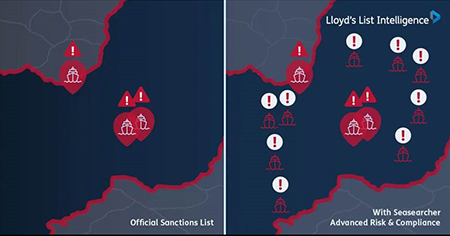A message to the marine insurance market: Conduct your KYC or risk fines
For every sanctioned vessel committing dark port callings and dark ship-to-ship transfers, there could be three more not on any sanctions list taking part in the same illicit activity
The maritime guidance from US and UK regulators Ofac and Ofsi sends a clear message to marine insurers: stay vigilant, know your customer and monitor those you are insuring
VETTING of existing and prospective customers and their vessels is becoming increasingly complex.
This is a challenge faced not just by insurers but everyone transacting with maritime trade entities, throughout the complex web of shippers, cargo owners, charterers and shipowners, through to trade finance, classification societies, flag states, P&I clubs and underwriters.
Marine insurance companies have fared relatively well sailing under the radar of sanction watchdogs, although one US P&I club in 2015 was fined a six-figure sum for providing P&I cover to North Korean vessels. This served as a warning to the industry.
In terms of regulatory scrutiny, however, 2015 is a long time. Today, there are increased sanction programmes, more agile sanction evaders, but also improved monitoring capabilities.
It is not sufficient to simply look up whether a vessel or a company is sanctioned. Everyone interacting with a vessel, vessel cargo, vessel owner or charterer has been asked to adopt a risk-based approach to compliance checks.
There is a need for marine insurers to interpret this guidance and quickly get a view of the fleet and operators they underwrite, to monitor high-risk area callings, sanctions and potential sanction breaches.
However, don’t just take my word for it. In May 2020, the US Department of the Treasury’s Office of Foreign Assets Control (Ofac), US Department of State and the US Coast Guard issued a Sanctions Advisory for the Maritime Industry and Related Communities entitled: Guidance to Address Illicit Shipping and Sanctions Evasion Practices.
Within this 35-page document, the first industry group to be given specific guidance and a call for action is marine insurance companies.
Ofac’s equivalent in the UK, the Office of Financial Sanctions Implementation (Ofsi), issued corresponding guidance in December 2020 directed at the UK maritime industry. It referenced the UK marine insurance market’s large global market share and the important role the (marine) insurance industry has to play in responding to, and reporting, illicit shipping practices.
While much of the advice to the maritime industry is consistent across the documents, including monitoring of ship-to-ship transfers, AIS disablement, ownership and control, and cargo falsification, it signals that insurers and others will be under scrutiny from at least four distinct regulatory bodies in the US, the UK, the European Union and the UN, and any other independent sanction regimes.
Increased scrutiny, and opportunity
Sanction and AML-related compliance checks are not going away anytime soon. They have moved from being considered optional to a requirement, whether you are in underwriting, claims or loss prevention. The risk of contravention can lead to significant fines and reputational risks.
As reported by Lloyd’s List in conversations with HFW, post-Brexit UK brings forth another unilateral sanction regime that is likely to diverge from its EU and US counterparts. The UK maintains its Sanctions and Money Laundering Act 2018, which sets the framework for unilateral sanctions, thus adding to those from the US, and from the EU bloc and the UN.
The fact that the marine insurance market is dominated by companies incorporated in or operating from the UK and the US, home to the most active sanction regulators, means more insurers in these regions are expected to be held to a higher standard.
Apart from the geographical market share, the pressure on the insurance market to detect and monitor sanctions-evading practices is no surprise.
A vessel that has class and P&I cover from reputable groups is already seen as less risky. This is only true, however, if the activities of the vessel insured and its related parties are monitored.
The concern of the regulators ― and rightly so ― is that a vessel with an active P&I club, particularly from the International Group of P&I Clubs or other reputable insurer (much like a vessel sailing under an IACS class), is perceived as already having undergone increased scrutiny and thereby subjected to less-stringent checks by other counterparts. This is not always the case.
When it comes to sanctions-evading practices, even shipping companies or operators with a strong track record for marine safety might have been involved in activity or actions that contravene the sanctions guidance, whether wittingly or unwittingly. Document forgery is also widespread and detected regularly by trade finance institutions.
Despite KYC and monitoring now taking up more time, there are several opportunities to be better prepared. Those seeking to slip under the radar by conducting illicit activity have become shrewder at covering their tracks as part of deceptive shipping practices, through means of AIS disablement, ship-to-ship transfers in undesignated places, and manipulating information.
However, those of us monitoring these practices have become shrewder too. There are several red flags that can be monitored, as well as ways of running checks that can save rather than add time.
AIS, for instance, is a requirement of the International Convention for the Safety of Life at Sea (Solas) and, while an operator can justify some AIS disablement, AIS gaps and periods of disruption, three-month gaps with recorded draught changes, destination changes and no port calls are clear red-flag identifiers.
Critical to effective screening is reducing the noise and removing false positives, especially for specific guidance such as monitoring AIS manipulation, STS, and verifying documents like the Bill of Lading, or similarly determining ultimate beneficial ownership.
Seasearcher Advanced Risk & Compliance data shows that, for every sanctioned vessel that continues to commit probable dark port callings and dark ship-to-ship transfers, there could be three more vessels not on any sanctions list that are actively taking part in the same type of probable illicit activity.
Thankfully, the use of machine learning and AI, coupled with an extensive terrestrial and satellite AIS network managed by Lloyd’s List Intelligence, means these practices can be detected.
The patterns of behaviour it can identify include suspicious AIS gaps and probable loitering, which could evolve into the more serious possibility of dark port callings and dark STS transfers that require further attention from compliance risk professionals.
Insurers can maintain watchlists or be alerted to vessel behaviour that warrants checks and could be in breach of cover on the insured fleet and operators. This makes it easier for colleagues to perform first-line screening or deeper compliance investigations and renders it increasingly difficult for potentially illicit actors to hide.
For more information about Lloyd’s List Intelligence’s Advanced Risk & Compliance screening tool, please contact client.services@lloydslistintelligence.com or visit https://www.lloydslistintelligence.com/services/data-and-analytics/advanced-risk-and-compliance.
This article is part of Lloyd’s List’s special report on Marine Insurance, which will be published in full this week. Subscribers can now access a downloadable PDF of this report by clicking here.



